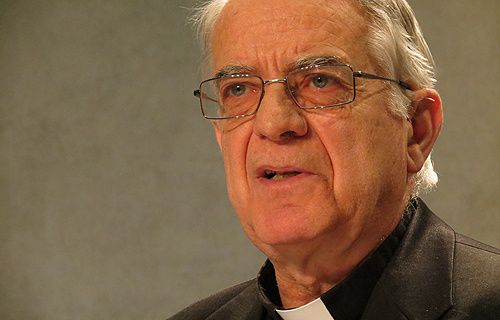The Holy See's press officer said Tuesday that its report on an anti-torture agreement which will be made to the U.N. next month is routine, and a part of its obligations as a signatory to the treaty. “It is a standard procedure adhered to by all States party to the Convention” against Torture, Fr. Federico Lombardi said April 15. “Considering the types of obligations included in the Convention, the Holy See signed the Convention in 2002 exclusively in the name of and on the part of Vatican City State.” “For this reason, the Holy See continues to fulfil its obligations on the part of Vatican City State and to present periodical reports, in accordance with the procedures set forth in the Convention.” The Holy See will submit its report this May, along with the states of Cyprus, Lithuania, Guinea, Montenegro, Sierra Leone, Thailand, and Uruguay. Each of the 155 states which are parties to the U.N. Convention against Torture — including the U.S. — are obliged to report to the international organization's Committee against Torture every four years about its implementation. The Center for Constitutional Rights, a legal group which represents the Survivors Network of those Abused by Priests, meanwhile said April 14 that the Vatican had been “summoned” to report about sexual abuse and cover-ups in the Catholic Church to the U.N. committee. The center contends that failures in the Holy See’s response to sexual abuse constitutes a violation of the convention. The Center for Constitutional Rights has earlier asked that the International Criminal Court prosecute Benedict XVI and other Church leaders, alleging they had direct responsibility for sexual violence and crimes against humanity. Critics saw the move as a publicity stunt that undermined human rights law and was based in a misunderstanding of how oversight works in the Church, where local bishops and religious orders are primarily responsible for the actions of clergy. The International Criminal Court dismissed the center’s investigation request in June 2013 on the grounds that it did not fall within the court’s jurisdiction. In January 2014, the U.N. committee that oversees the implementation of the Convention on the Rights of the Child controversially criticized both the Church’s handling of sex abuse and Catholic moral teaching. The Committee on the Rights of the Child’s report claimed that the Vatican had “systematically” adopted policies that allowed priests to rape and molest children. That report also criticized the Catholic Church's teachings on contraception, abortion and same-sex “marriage,” suggesting that the Church change canon law to support these “rights.” Catholic leaders, including Fr. Lombardi and the archbishop leading the Holy See’s permanent observer mission to the U.N., said the report failed to acknowledge the Church’s progress in protecting children and tried to impose secular views upon the Church. Pope Francis on April 11 asked forgiveness for priests who sexually abused children. He said the Church’s response to sex abuse has to be “even stronger.” The Pope has also affirmed the Church’s efforts to combat abuse. In a March 5 interview with the Italian daily Corriere della Sera, he denounced cases of abuse by clergy as “terrible” and acknowledged the “extremely deep wounds” abuse can cause. He praised Benedict XVI’s “very courageous” efforts, saying his predecessor “cleared a path” in response to abuse. “The Church has done so much on this path. Perhaps more than anyone,” Pope Francis said. “The Catholic Church is perhaps the only public institution to have acted with transparency and responsibility. No other has done more. And, the Church is the only one to be attacked.”

